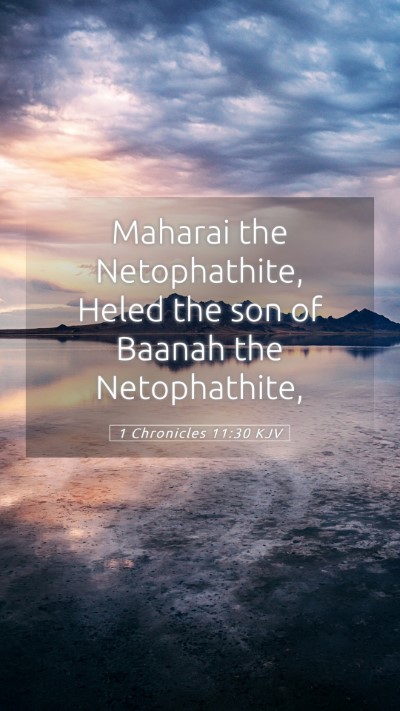Understanding 1 Chronicles 11:30
Bible Verse: 1 Chronicles 11:30 - "And Ahijah, the son of Ahitub, the son of Abiathar, is the priest; and Ahijah, the son of Ahitub, the son of Abiathar, is the priest." (KJV)
Introduction
This verse, while simple in its presentation, captures significant theological and historical insights. It speaks to the importance of lineage, priesthood, and the role of Ahijah in the Davidic kingdom. The combination of insights from public domain commentaries sheds light on its deeper meanings, offering rich opportunities for study and reflection.
Bible Verse Meanings: A Combined Commentary
In examining the meaning of this verse, we find collective insights from reputable Bible commentaries:
- Matthew Henry: Henry emphasizes the significance of true lineage in priestly duties. He notes that Ahijah symbolizes a continued tradition in the priesthood, showcasing God's plan through the family of Abiathar. This reflects the importance of faithful service and commitment in spiritual leadership.
- Albert Barnes: Barnes offers a historical perspective, highlighting the political and religious climate at the time. He points out that recognizing Ahijah as a vital priestly figure demonstrates the transition in leadership during David's reign, affirming God's choice in establishing his anointed king and the support from the Levitical priesthood.
- Adam Clarke: Clarke delves into the implications of Ahijah's role, emphasizing how the priesthood serves as a conduit for divine communication between God and His people. The listing of Ahijah emphasizes the continuity and unbroken chain of priestly authority from the past to the present, reinforcing God’s unchanging covenant with Israel.
Interpretative Themes
Through our analysis, several core themes emerge from this scripture:
- Continuity of Leadership: The passage underscores the necessity of continuity in spiritual leadership, both for the physical nation of Israel and for modern believers seeking connection with oneself and with God.
- God’s Sovereignty: Ahijah’s mention is a reminder that God orchestrates the details of His covenant people, choosing priests and leaders according to His divine purpose.
- Importance of Heritage: The lineage of Ahijah serves to remind the faithful of the importance of spiritual heritage and the passing down of godliness through generations.
Application of the Verse
Understanding 1 Chronicles 11:30 leads to several practical applications for believers today:
- Consider your own spiritual heritage and how it influences your faith journey.
- Recognize the importance of faithful leaders in your community and support them in their spiritual callings.
- Reflect on the ways God’s sovereignty is evident in your personal and communal history, affirming that He has a purpose for each believer's life.
Bible Study Insights
This verse can serve as an anchor in Bible study groups, where participants can explore themes of leadership, lineage, and the importance of faithful service in their lives.
- Bible Study Topics: Discussion on priestly roles in both Old and New Testaments.
- Online Bible Study Resources: Leverage tools that address Old Testament history and themes of leadership from a biblical perspective.
- Bible Study Guides: Incorporate lessons on the significance of spiritual lineage and continuity in God’s plan.
Cross References
This verse can be related to multiple other scriptures which enhance its meaning and application:
- 1 Samuel 22:20-23: Discusses the escape of Abiathar and the priestly lineage.
- 2 Samuel 8:17: Mentions the priests who served during David's reign, helping to establish the dynasty.
- Hebrews 7:11-15: Reflects on the order of Melchizedek and its implications for biblical priesthood.
Conclusion
1 Chronicles 11:30 serves as a poignant reminder of God's providential care throughout history. By studying this verse and embracing its meanings, believers are granted insight into their own spiritual journeys and the overarching narrative of Scripture. Engaging in scripture analysis and biblical exegesis becomes a vital practice not only in gaining knowledge but also in forming a closer relationship with God through His Word.


